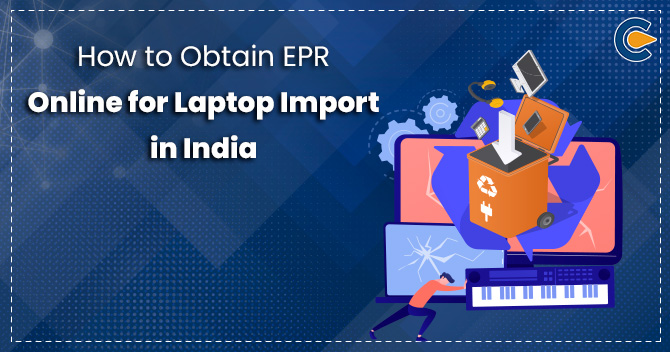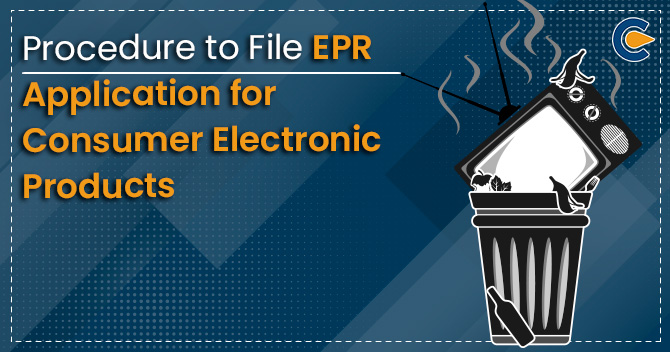EPR Authorization for laptop import is given by the Central Pollution Control Board (CPCB) under MoEFCC, Government of India. Importers of EEE items like laptops are categorised as PIBOs and are stakeholders in the electronic and electrical equipment market. Their role in E-waste management has been emphasised recently in the amended PWM rules 2016, published in March 2021. Importer means someone who imports or intends to import and holds an Importer Exporter Code (IEC). Under the PWM Rules, the importers, along with producers and brand owners, have been identified as entities that introduce a product in the market that will generate e-waste after the end of life of their products. They have been assigned to collect back the plastic waste generated due to their product.
As per the implementation guidelines issued by the CPCB for e-waste management rules, importers of EEE items like laptops for the purpose of sale need to have an EPR certificate. Importers along with producers are liable to collect back EEE introduced by them in the market through buy-back schemes, collection programmes and collection centres. However, if a manufacturer or importer fails to acquire an EPR authorisation for laptop Import, it won’t be able to operate in India. Manufacturers or importers can face debarment, fine, or both if Extended Producer Responsibility authorisation is not obtained. For manufacturers and importers, it is mandatory to procure the EPR certificate to keep E-waste under control.
As per a clarification issued by CPCB regarding the non-applicability of EPR Authorisation under E-waste Management Rules 2016, EPR authorisation will not be applicable in the following cases.
- An EPR for laptop import in India is not required If the Import of Electrical and Electronic Equipment is done for the purpose of selling them to an EPR authorised producer. EPR for laptop import will not be required in this case as the importer is not introducing the product in the market.
- Secondly, if consumers or bulk consumers import Electrical and Electronic Equipment like a laptop for self or captive use, they will not need EPR authorisation. Provided that the bulk consumer submits a self-declaration on stamp paper to the customs/ports authority stating that the imported EEE item is intended for self or captive use and not for sale to the end consumers in the market.
Role of Producers Responsibility Organisation (PRO)
The producer/importers have been given options to manage their EPR responsibilities individually or through the Producer Responsibility organisation (PRO). A PRO can take responsibility for the collection and channelisation of e-waste generated from the end of life of their products and help them achieve collection targets, setting up collection points, carrying awareness programs, etc. CPCB mentions a list of the registered PRO authorised to manage EPR responsibilities for importers and producers in the country.
SOP for EPR authorisation
CPCB is the nodal agency for the grant of EPR authorisation for laptop import in the country. Application to Obtain EPR Online for Laptop Import in India can be submitted by post or courier service to the CPCB. The concerned authority at CPCB evaluates the applications received and grant EPR authorisation for laptop import within 120 days of the receipt of those application, complete in all respect. In case of incomplete applications, the CPCB responds with a checklist within 25 days and a letter mentioning the issues to the applicant. The application status is displayed in a simple web-based application on the CPCB website[1].
Approval of EPR authorisation
- The Chairman of the CPCB shall approve the EPR plan for laptop import. In case of renewal of EPR authorisation for laptop import, the Member Secretary is the approving authority.
- In case of amendment in existing EPR authorisation, the Division Head for the amended subject would issue amended EPR authorisation.
- Refusal of EPR authorisation: CPCB can refuse EPR authorisation to an applicant if he cannot provide requisite details on quantity, EPR plan and RoHS self-declaration, and agreement copy with authorised dismantler/recyclers within 45 days from the receipt of the letter from CPCB. An opportunity to present its case will be given to the applicant before the refusal of grant of EPR authorisation.
A person can appeal the cancellation, suspension, or refusal to grant renewal of the EPR online for laptop import by the CPCB within 30 days in Form 7 to the appellate authority, the Secretary of the MoEF&CC.
Documents Required For EPR Certification
- GST certificate
- Importer Exporter Code (IEC)
- Sole proprietor or Authorized Signatory KYC
- To demonstrate the ownership of the site, submit the rent or lease proof
- Memorandum of Association
- Details of imported products like EEE code, quantity imported etc
- Form 1 for EPR authorisation
- EPR plan copy of permission from relevant Ministry/ Department for selling their product
- Copy of agreement with dealers, collection centre, recyclers, treatment storage and disposal facilities
- Copy of trade licence issued by Directorate General of Foreign Trade.
- Self-Declaration, including the importer’s name and authorised person, brand name, and contact details.
Validity of authorisation of EPR online for Laptop import in India
The authorisation received will be valid for five years. The EPR authorisation for laptops Import in India falls under Personal Computing: Laptop Computers (Central Processing Unit with input and Output device) (ITEW3), will be subject to certain compliances like
- Ensuring setting up of collection mechanism or collection centre as per the submitted EPR plan
- Ensuring that the collected e-waste generated is channelised to the manufacturer’s/importer’s dismantler or recycler
- submitting the sales records to the CPCB department.
- EPR Authorization holder needs to organise two seminars on an annual basis for general public awareness
- EPR authorisation holder needs to fulfil the E-Waste Target as per the EPR authorisation.
Conclusion
The term importer comes under the ambit of producers as the definition of the term of producer includes a person who offers to sell or distribute imported electrical and electronic equipment and their spare parts. Importer of Laptop in India needs to comply with the necessary provisions for PIBOs. Therefore, obtaining an EPR online for laptop import becomes essential for the importers, although they are not involved directly in the manufacturing of the product. The plastic packaging used in the packaging of laptops also calls for extended producer’s responsibility for laptop manufacturers and importers.
Read our Article:Draft of E-waste Management Rules











